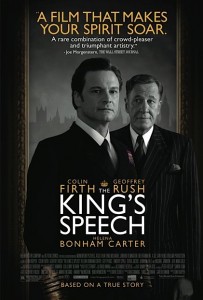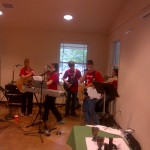The King of kings Speech
Have you seen the Academy Award winning film The King’s Speech? Under my radar for years, it now is among my all-time favorite movies (sorry, nothing will eclipse “The Mission”). It is at its core a story of depravity, love and transformation. Let me explain.
God is pleased to meet us where we are but is not satisfied to leave us there.
I would like to believe that statement originated with me. In some sense it is so simple it could have been me. In some ways it is so profound to make that all but impossible. Regardless, germane to all of us in relationship to this truth is what prevents us from getting from the place where we were met to the ultimate destination or where God would have us go. .
It is grace that saves us. It is no less grace that sanctifies us. What is sanctification? It is to be transformed into the likeness of the son. It is God acting upon us in the first instance. It is God acting upon us in the second. In 2 Corinthians 3 Paul outlines this as he makes clear the work of the Holy Spirit under the new covenant even as the glory of the old fades away. Said another way, the Word that creates us (ex nihilo) is the Word that recreates us in the image intended for us from the beginning of time. As Luther states in the Heidelberg Disputation, “The love of God does not find, but creates, that which is pleasing to it.”
What I have experienced personally I have observed in others throughout my 25 years of ministry. And it is this. In my own feeble attempts to grow in the likeness of the Lord I have found voids in my early life that prevent me from moving forward in maturity. I have heard words from the world. They have formed me and shaped me for better or worse. And they have not been addressed by the Word of God.
I disciple and/or counsel people routinely who are unaware of how powerfully this dynamic is at work in them. This is especially true among men. Without making the typical universal, it is fair to say we are less self-aware. Ask your wife o(r girlfriend or sister) if you doubt me.
This is illustrated so well in a true story made into an academy award winning film “The King’s  Speech.” Bertie (nickname for Prince Albert) who becomes King George VI when his brother abdicates the throne struggles in his adult life due to words from his childhood that have not been addressed, indeed healed, by the Word of God or Real Royal Words. The struggle is made manifest in a stammer that is as crippling as polio would be. About this, Bertie is keenly unaware.
Speech.” Bertie (nickname for Prince Albert) who becomes King George VI when his brother abdicates the throne struggles in his adult life due to words from his childhood that have not been addressed, indeed healed, by the Word of God or Real Royal Words. The struggle is made manifest in a stammer that is as crippling as polio would be. About this, Bertie is keenly unaware.
Bertie’s father, King George V, dies while Bertie is second in line to the throne. Overwhelmed with emotion at his father’s death he appears unannounced in the office or studio of his speech therapist Lionel Logue (Bertie’s unconditional love incognito). In the next nine minutes (see it beginning at 45:46) he reveals indescribable pain associated with his youth. He does so without much emotion or affect. He is unaware of just how much what he is saying has become embedded in his DNA.
Bertie describes a number of scenes from his youth. He casually says he always wanted to build model airplanes but his father would not allow it. His father was a stamp collector so he had to be one as well. When Lionel asks him, who he was closest to when he was a child, without hesitation Bertie said nannies. He describes a childhood in which he was dressed by others and presented daily to his parents along with his siblings. He was necessarily close to nannies but not his first nanny! She loved his brother David but not him. She did not feed him adequately. It took his parents three years to notice.
Elsewhere, Bertie speaks of his father’s method of parenting. “I feared my father. My children will damn well fear me.” At the end of their time together he spoke of correction made in his life. He was disciplined out of being naturally left-handed. Though Bertie is unaware of the catharsis taking place he thanks Lionel for being available to him. Lionel says “what are friends for!?” Bertie quietly says, “I wouldn’t know.”
Any reasonable person would watch these nine minutes of film and wonder how Bertie has made it in life as far as he has. Can you imagine your most intimate time with your parents being a daily viewing? Can you imagine those responsible for your nurture not noticing you weren’t being fed properly for three years? Can you imagine (and I bet many can) fear being the governing principle of parenting? Can you imagine life without friends?
These are the words, the grotesquely painful words, that have shaped Bertie’s life. They have left him with a stammer. More significantly they have left Bertie unprepared for adult life. What would God say in response? We have heard The King’s Speech. But what would the King of kings say? What are the Real Royal Words there for Bertie, the Words that would heal his broken heart and life?
It seems self-evident to me that God would want Bertie to know he is fearfully and wonderfully made (Psalm 139:13-14) and that he is unique in that way. He need not be governed by his father’s need to live through him or his own urge to satisfy his father by being his father (as a stamp collector and otherwise). It seems self-evident that God would want him to know that his Heavenly Father knows the number of hairs (Luke 12:22-34) upon his head. He cares for sparrows. How much more does he know when a child of His is not being fed? It seems self-evident that God would want him to hear that perfect love casts out fear (1 John 4:16-18). And that absent that fear we are much better able to love in the likeness of Jesus. It seems self-evident that God would want Bertie to hear Him shout in Jesus what a friend he has in him (John 15:9-17).
The painful words of Bertie’s youth must be addressed by Real Royal Words. Otherwise they become wounds untreated and an obstacle to health (salvation as wholeness). Real Royal Words in response to all the other words we hear are the milk that prepare for us for solid food. They are the nutrients that we take in during the early miles that allow us to run with perseverance the race. This is not a shallow “power of positive thinking” nor an even more shallow healing to be named and claimed. It is being healed by a Word that saves, by a powerful Word that prospers the purpose for which God sends it and does not return to Him void.
God is pleased to save us right where we sit. But he is not satisfied to leave us there. He wants to remake us more in the likeness of His Son. But words spoken to us in our youth far too often stand in the way. We are wounded. To God be the glory, “Yes, Jeremiah, there is a balm in Gilead.” Let us hear again real royal words that heal and reshape us. Let us hear the real King’s Speech that we take up the goal of maturity (telos), that we might run again the race set before us and move toward the prize, an ever increasing likeness of Jesus.



